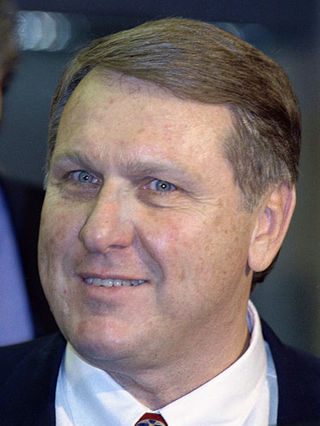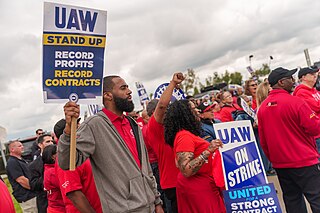Related Research Articles

The 1936–1937 Flint sit-down strike, also known as the General Motors sit-down strike, or the great GM sit-down strike, was a sitdown strike at the General Motors plant in Flint, Michigan, United States. It changed the United Automobile Workers (UAW) from a collection of isolated local unions on the fringes of the industry into a major labor union, and led to the unionization of the domestic automobile industry.

The United Auto Workers (UAW), fully named International Union, United Automobile, Aerospace and Agricultural Implement Workers of America, is an American labor union that represents workers in the United States and southern Ontario, Canada. It was founded as part of the Congress of Industrial Organizations (CIO) in the 1930s and grew rapidly from 1936 to the 1950s. The union played a major role in the liberal wing of the Democratic Party under the leadership of Walter Reuther. It was known for gaining high wages and pensions for automotive manufacturing workers, but it was unable to unionize auto plants built by foreign-based car makers in the South after the 1970s, and it went into a steady decline in membership; reasons for this included increased automation, decreased use of labor, mismanagement, movements of manufacturing, and increased globalization. After a successful strike at the Big Three in 2023, the union organized its first foreign plant (VW) in 2024.

James Phillip Hoffa, also known as James Hoffa Jr. or Jim Hoffa, is an American labor leader and attorney who was the tenth General President of the International Brotherhood of Teamsters. He is the son of Jimmy Hoffa. Hoffa was first elected in 1998, and re-elected in 2001, 2006, 2011, and 2016 to five-year terms. In 2018, Hoffa was elected chair of the Road Transport Section of the International Transport Workers' Federation at its quadrennial Congress in Singapore. Hoffa is the second-longest serving General President of the Teamsters Union, after Dan Tobin, who served from 1907 to 1952. Hoffa's final term as General President ended in 2022.

A sit-down strike is a labour strike and a form of civil disobedience in which an organized group of workers, usually employed at factories or other centralized locations, take unauthorized or illegal possession of the workplace by "sitting down" at their stations. By taking control of their workplaces, workers engaged in a sit-down demonstrate their power, build solidarity among themselves, prevent the deployment of strikebreakers or removal of industrial equipment, and cause cascading effects on the chain of production within and between factories. However, sit-down strikes are illegal in the vast majority of countries, complicating their use.
Leeds Assembly was a General Motors automobile factory in Leeds, Missouri. It was closed in 1988. The factory produced the A-bodies and J-bodies.

The Lordstown Complex is a factory building and automotive manufacturing plant in Lordstown, Ohio, U.S. Lordstown is an industrial suburb of Youngstown, Ohio.
Owen Frederick Bieber was an American labor union activist. He was president of the United Auto Workers (UAW) from 1983 to 1995.
Reuther's Treaty of Detroit was a five-year contract negotiated by trade union president Walter Reuther between the United Auto Workers (UAW) and General Motors in 1950. The UAW reached similar deals with the other members of the Big Three automakers, Ford Motor Company and Chrysler. The UAW agreed to a long-term contract, which protected automakers from annual strikes, and it gave up the right to bargain over some issues in exchange for extensive health, unemployment, and pension benefits; expanded vacation time; and cost-of-living adjustments to wages.
The 2007 General Motors Strike was a labor union strike that lasted three days from September 23 to September 25, 2007, organized by the United Auto Workers (UAW) union. The UAW were engaged in talks with General Motors (GM) to negotiate a new labor contract but were unable to come to an agreement before the deadline. Consequently, 73,000 workers walked out forcing 80 GM facilities in 30 states to cease operations. After the two day strike, the two parties reached an agreement in which the UAW union would assume the responsibility for managing retiree healthcare liabilities. The UAW previously went on strike against General Motors in 1970.
Stephen Phillip Yokich was an American labor union activist who served as President of the United Auto Workers from 1994 to 2002.
The tool and die strike of 1939, also known as the "strategy strike", was an ultimately successful attempt by the United Auto Workers Union (UAW) to be recognized as the sole representative for General Motors workers. In addition to representation rights, the UAW, working jointly with the Congress of Industrial Organizations (CIO), sought to resolve existing grievances of skilled workers.
From November 21, 1945, to March 13, 1946, CIO's United Automobile Workers (UAW), organized "320,000 hourly workers" to form a nationwide strike against General Motors, workers used the tactic of the sit down strike. It was "the longest strike against a major manufacturer" that the UAW had yet seen, and it was also "the longest national GM strike in its history".

The Congress of Industrial Organizations (CIO) was a federation of unions that organized workers in industrial unions in the United States and Canada from 1935 to 1955. Originally created in 1935 as a committee within the American Federation of Labor (AFL) by John L. Lewis, a leader of the United Mine Workers (UMW), and called the Committee for Industrial Organization. Its name was changed in 1938 when it broke away from the AFL. It focused on organizing unskilled workers, who had been ignored by most of the AFL unions.

The 2015 Kohler Strike is the fourth strike in the 142-year-old history of the Kohler Company in Kohler, Wisconsin.
The 2021–2022 Columbia University strike was a labor strike involving graduate student workers at Columbia University in New York City. The strike began on March 15, 2021, and ended on May 13, 2021. However, additional strike action commenced on November 3 and lasted until January 7, 2022, when a tentative agreement with the university was reached. The strike was organized by the Graduate Workers of Columbia–United Auto Workers Local 2110 (SWC–UAW), a labor union representing student workers at the university. The goals of the strike were an increase in wages, increased healthcare and childcare coverage, and third-party arbitration in cases of discrimination and sexual harassment.
The 2021 Virginia Volvo Trucks strike was a labor strike involving workers at a Volvo Trucks production facility in Dublin, Virginia, United States. The strike began in April and ended in July with the ratification of a new labor contract.

The 2021 John Deere strike was a labor strike in the United States that began on October 14 and ended on November 17, and involved about 10,000 employees for John Deere, a manufacturer of agricultural and heavy machinery. These employees are members of the United Auto Workers (UAW) labor union, which had been negotiating a new contract with John Deere for several months. On November 17, the workers approved a new 6-year contract officially putting an end to the strike. The strike was John Deere's first in over three decades.

The 2022 University of California academic workers' strike was a labor strike at all campuses of the University of California (UC) system, including the Lawrence Berkeley National Laboratory. On November 14, some 48,000 academic workers went on strike for better pay and benefits. Led by the United Auto Workers (UAW) labor union, it was the largest strike in the United States in 2022; union organizers describe it as the largest strike in all of U.S. higher education.

The 2023 United Auto Workers strike was a labor strike involving automobile workers in the labor union United Auto Workers (UAW) and the three unionized automakers in the United States—Ford Motor Company, General Motors, and Stellantis. These three automakers' factories combined employ about 145,000 UAW members and produce about 50 percent of the vehicles manufactured annually in the US, accounting for 1.5 percent of US GDP. The strike began on September 15, 2023, when the union was unable to reach a deal with the three automakers. It was the first trilateral strike against the three automakers in the union's history.
On October 17, 2023, casino workers in Detroit began a strike against MGM Resorts International, operator of the MGM Grand Detroit, and Penn Entertainment, which runs the MotorCity Casino Hotel and Hollywood Casino at Greektown. Casino workers in Michigan's largest city, represented by the Detroit Casino Council (DCC), failed to reach a labor contract. The strike lasted 47 days for MGM and 34 for Penn Entertainment and ended after a contract was ratified between the DCC and both MGM and Penn.
References
- 1 2 3 4 5 LaReau, Jaime L. (October 25, 2019). "Strike over! UAW workers ratify contract with GM. Here's what's next". Detroit Free Press. Retrieved November 1, 2019.
- 1 2 Nicolaou, Anna (September 16, 2019). "GM workers strike after talks on pay and benefits break down" . Financial Times . Retrieved September 17, 2019.
- ↑ Campbell, Alexia Fernández (September 17, 2019). "GM workers are on strike to accomplish what Trump couldn't". Vox. Retrieved September 17, 2019.
- 1 2 "Fast Strike Against GM Breaks Years of Negotiating Precedent (1)". Bloomberg Law. September 16, 2019. Retrieved September 17, 2019.
- ↑ Boudette, Neal E. (December 16, 2019). "For G.M. Workers, U.A.W. Strike Is Chance for Overdue Reward". The New York Times . Retrieved September 17, 2019.
- 1 2 Kullgren, Ian; White, Ben; Lippman, Daniel (September 17, 2019). "White House intervenes in General Motors strike". Politico. Retrieved September 17, 2019.
- ↑ Axelrod, Tal (September 17, 2019). "General Motors stops paying for striking union workers' health insurance". The Hill. Retrieved September 18, 2019.
- ↑ "GM reverses itself, says will cover striking workers' health benefits". CBS News. Associated Press. September 26, 2019.
- ↑ Wayland, Michael (October 16, 2019). "GM, UAW agree on tentative labor contract that could end a monthlong strike by 48,000 workers". CNBC.
- ↑ Welch, David (September 14, 2019). "GM Faces $50 Million Losses a Day as UAW Digs In for Strike". Bloomberg. Retrieved September 17, 2019.
- 1 2 Wayland, Michael (September 17, 2019). "GM strike costing up to $100 million a day isn't worrying investors — at least not yet". CNBC. Retrieved September 17, 2019.
- ↑ Torry, Harriet (September 17, 2019). "GM Strikes Don't Pack Same Economic Punch They Did in the '90s". The Wall Street Journal . Retrieved September 17, 2019.
- ↑ Wong, Natalie (September 16, 2019). "GM Strike Poised to Affect Thousands of Canadian Auto Jobs". Bloomberg. Retrieved September 17, 2019.
- ↑ Leggate, James (September 15, 2019). "Teamsters refusing to transport GM vehicles in solidarity with UAW". Fox Business. Retrieved September 17, 2019.
- ↑ Saul, Stephanie (September 22, 2019). "Warren and Biden Join U.A.W. Picket Lines as Democrats Use Strike to Court Labor". The New York Times. ISSN 0362-4331 . Retrieved September 22, 2019.
